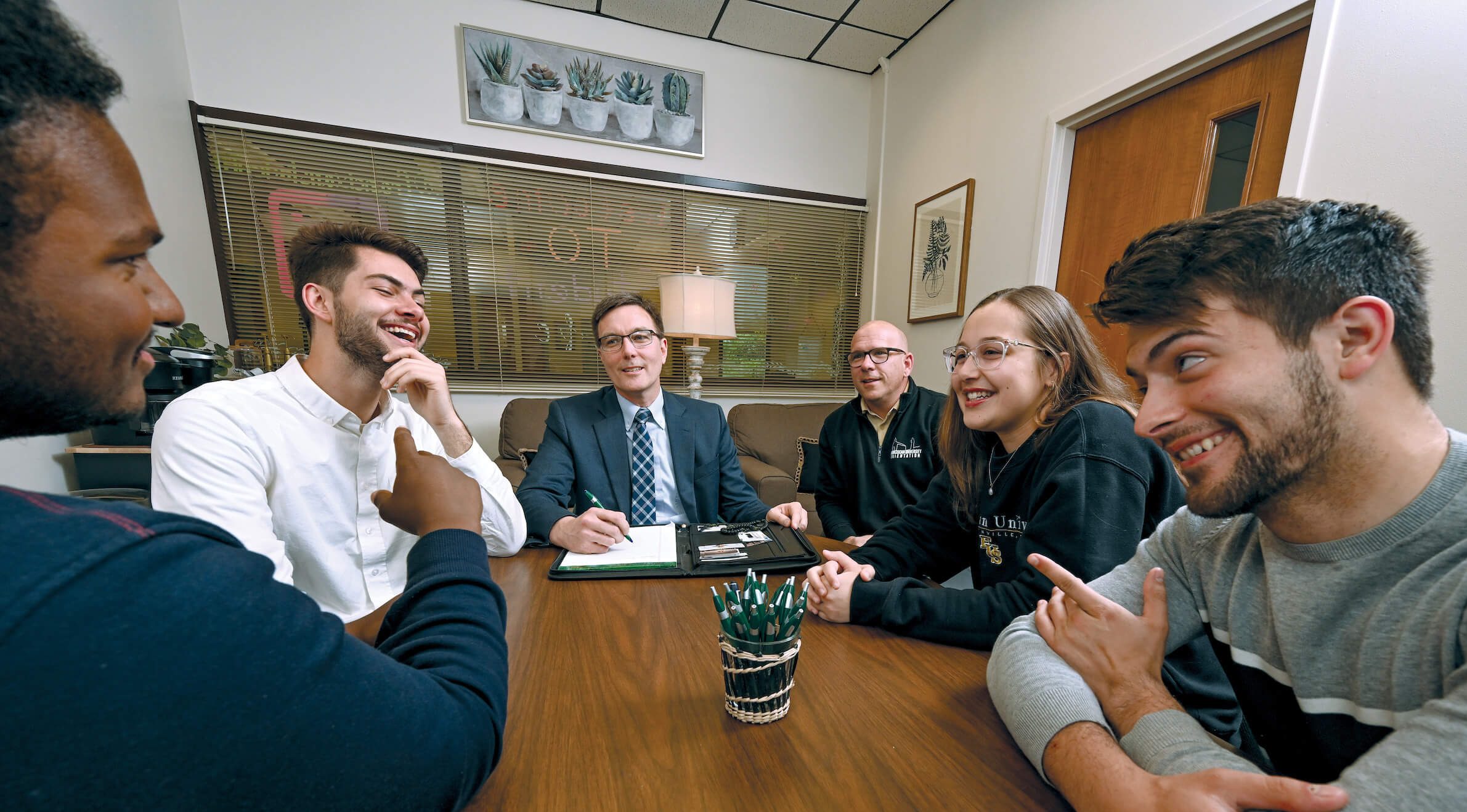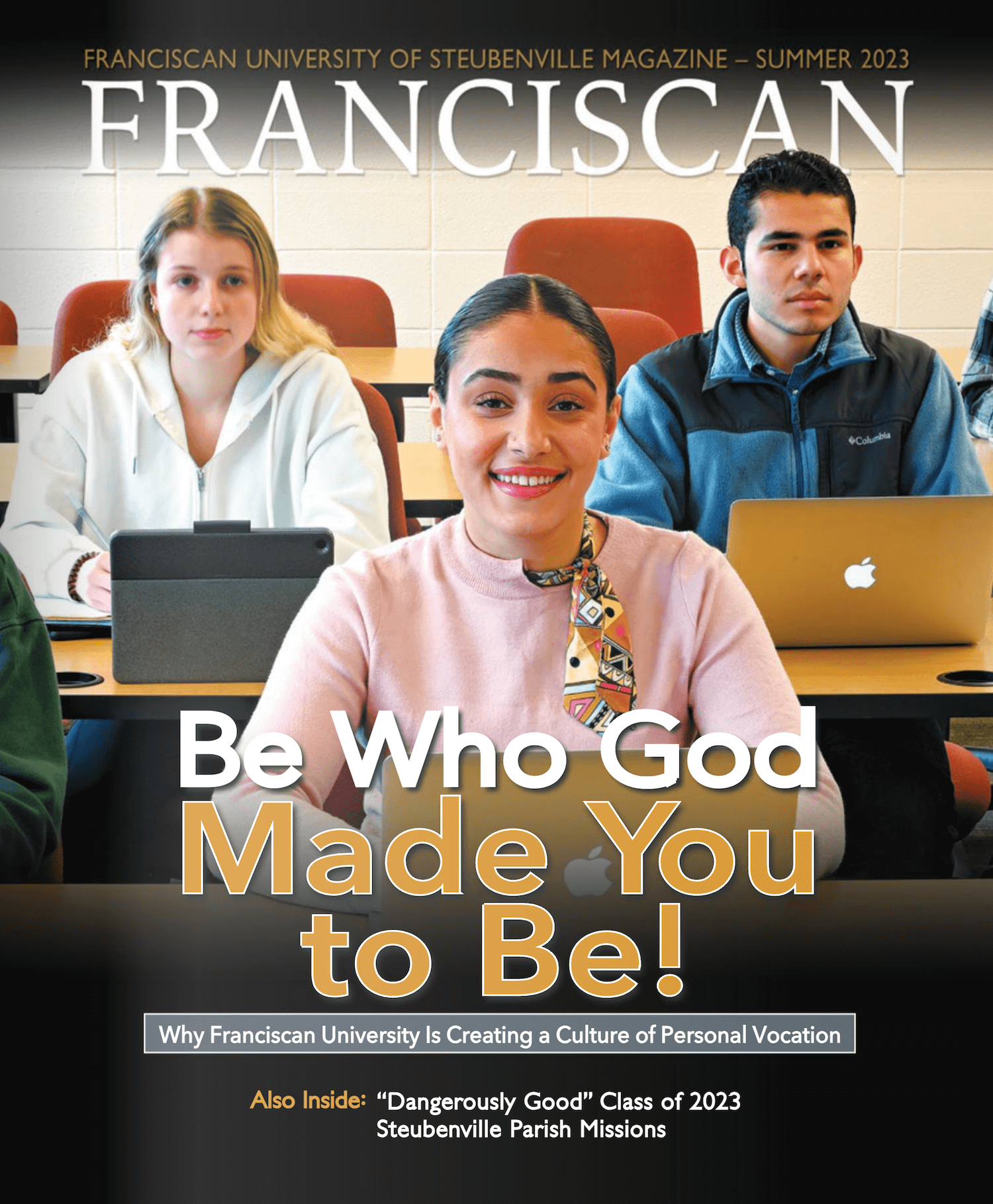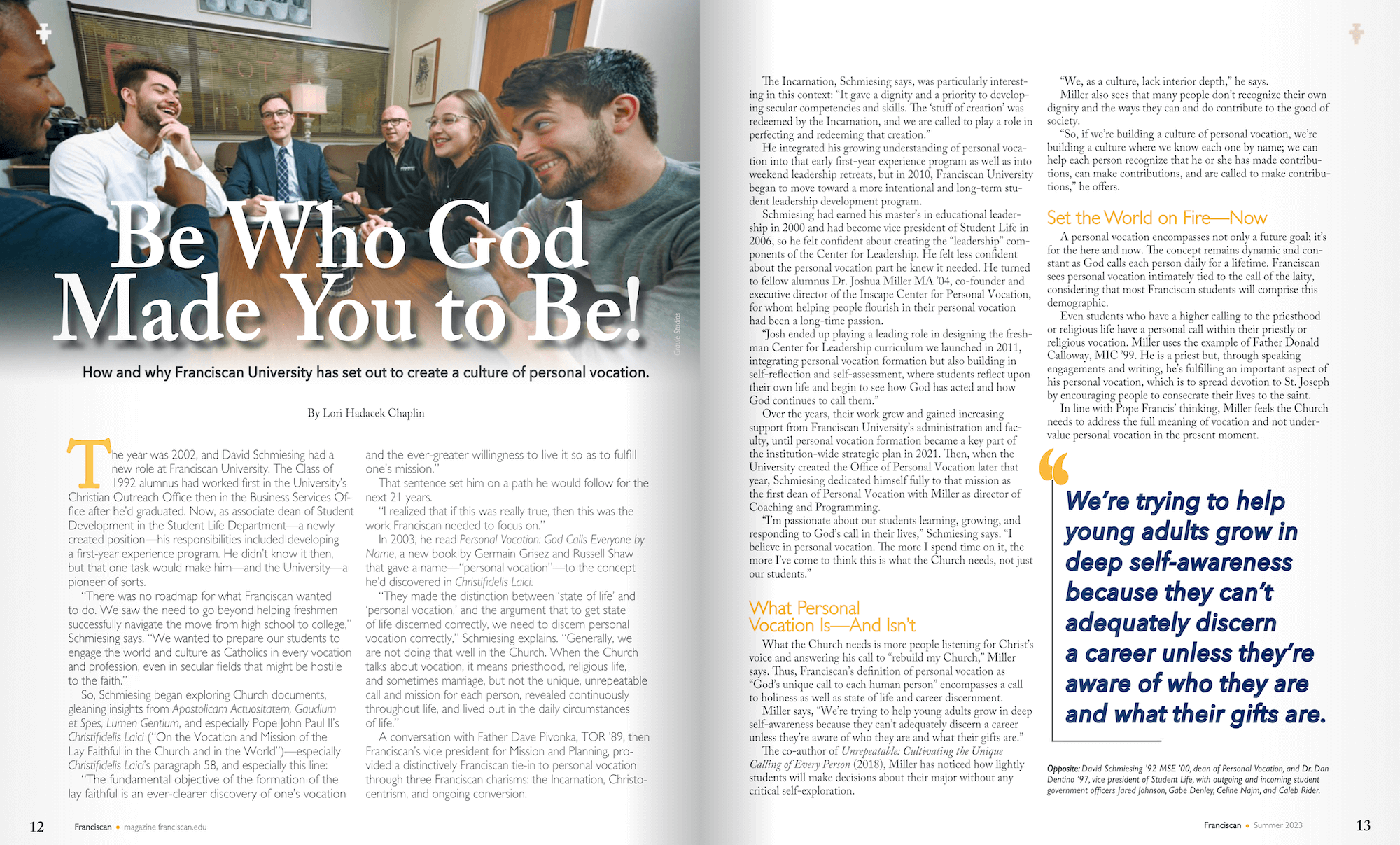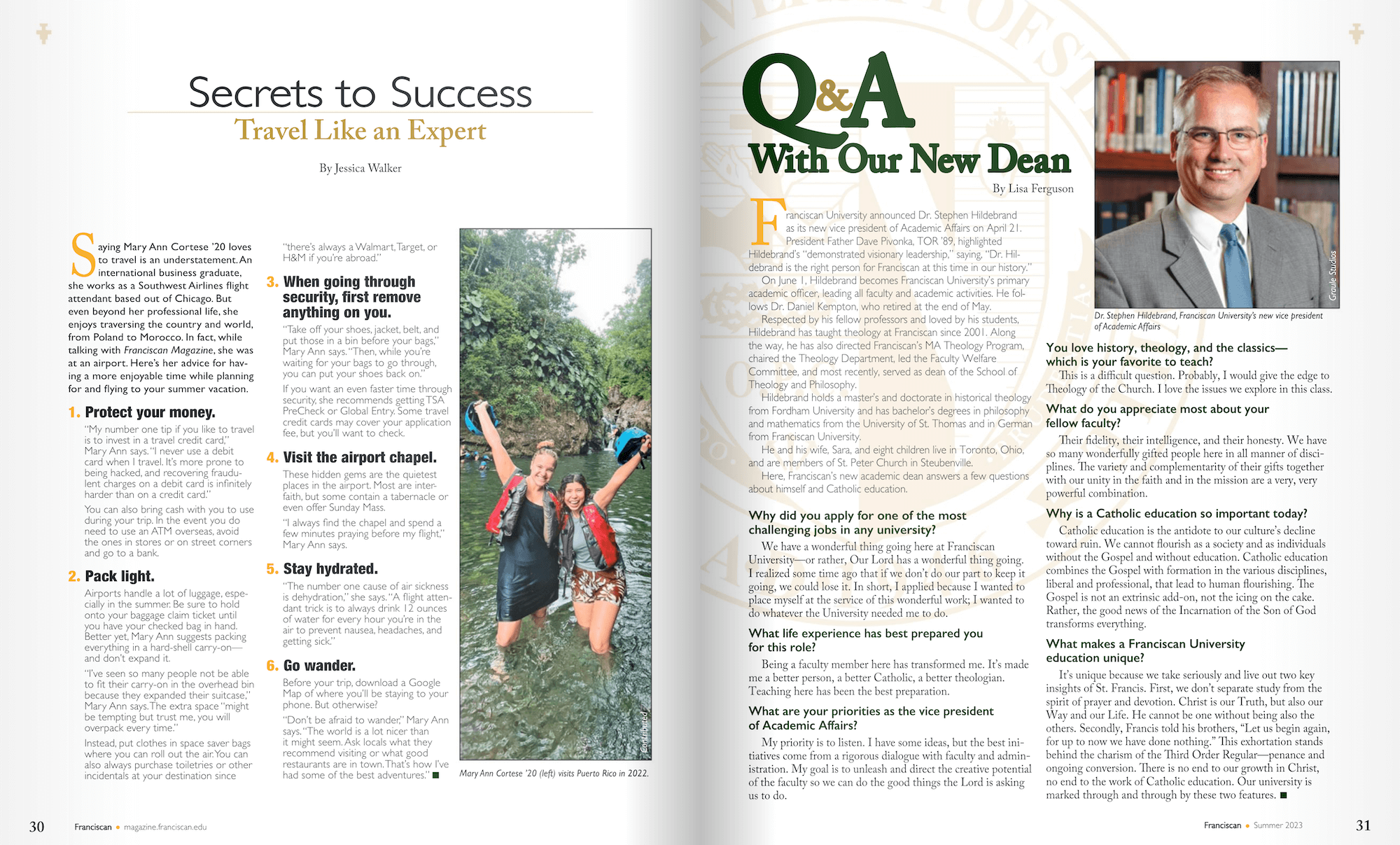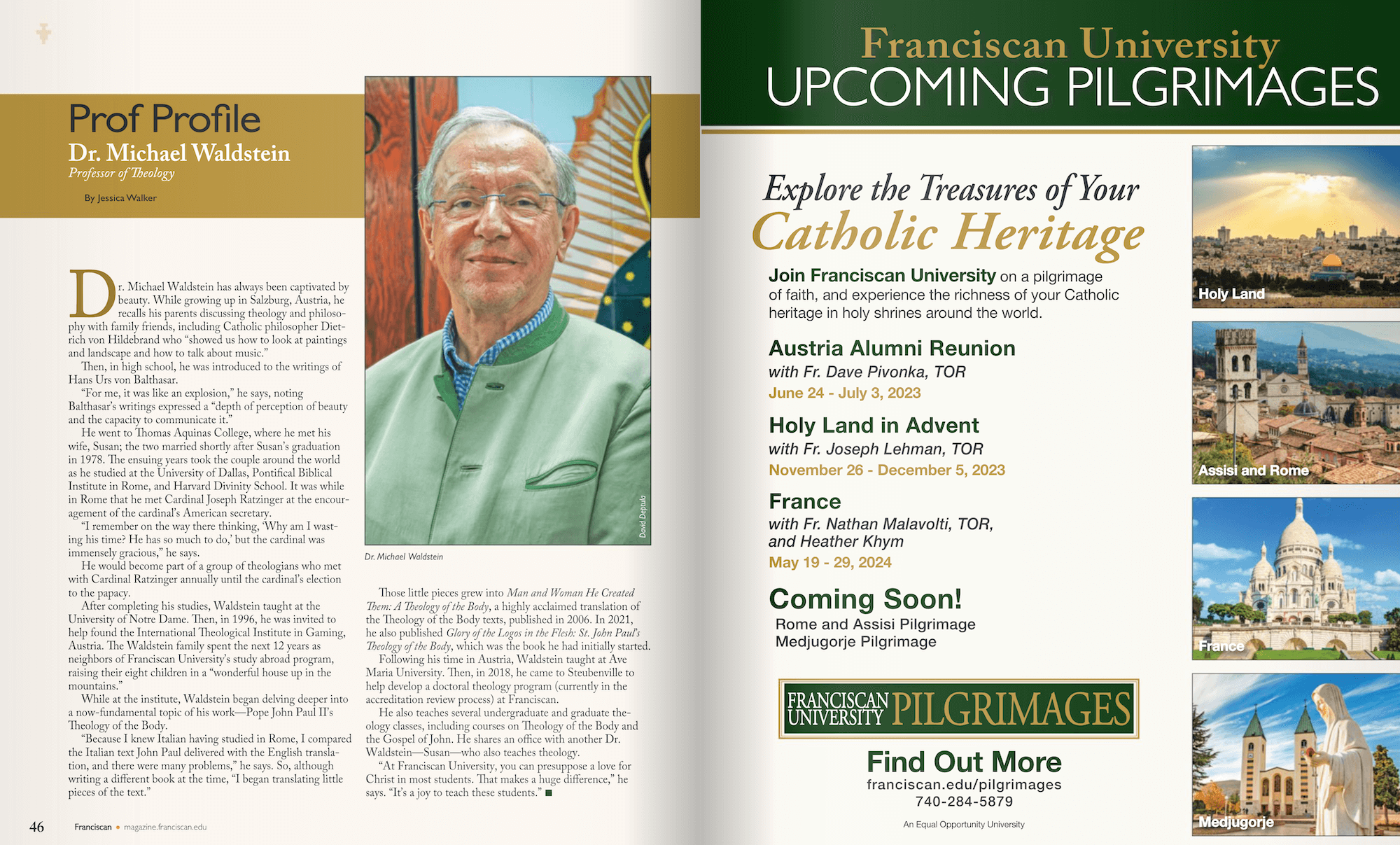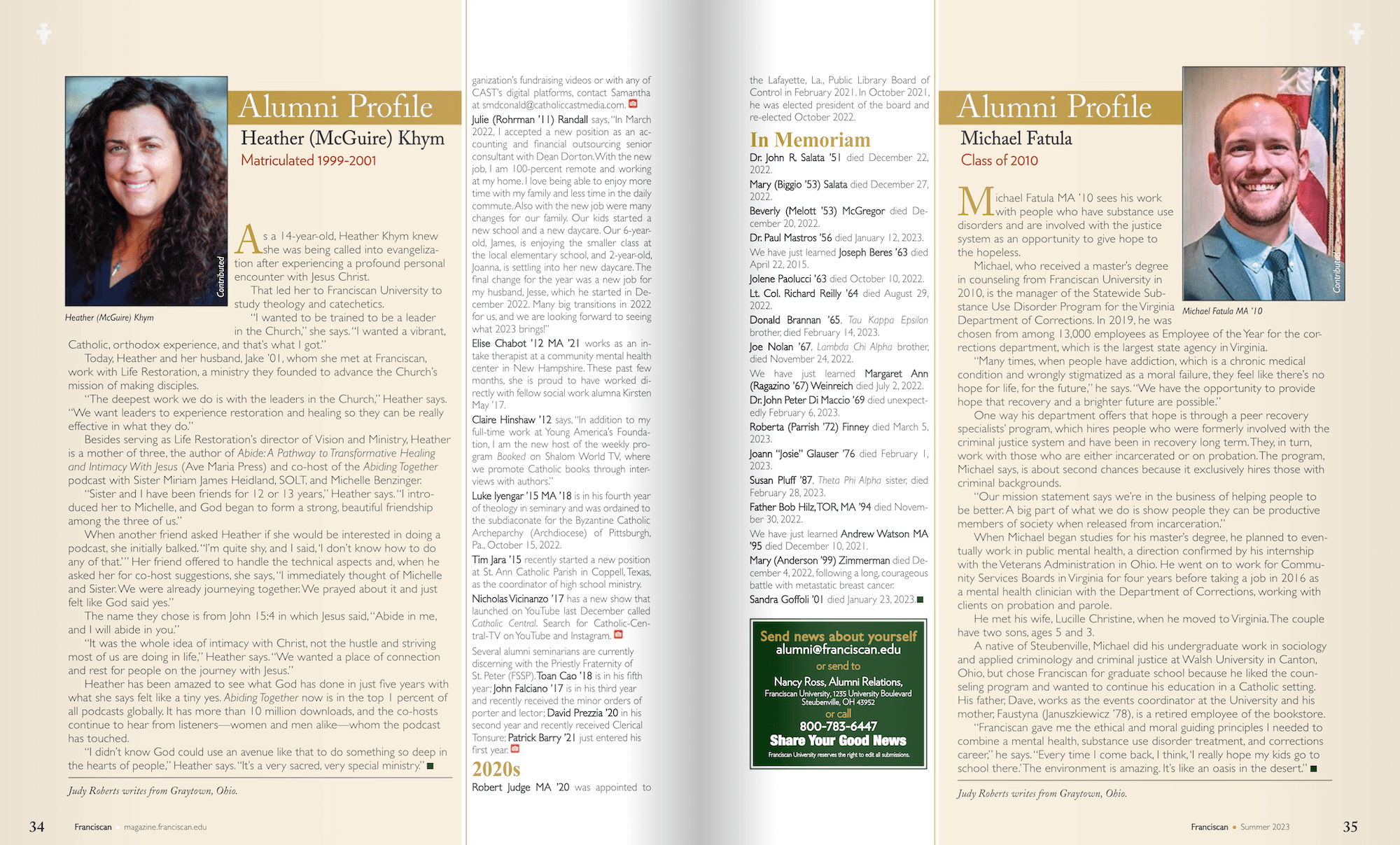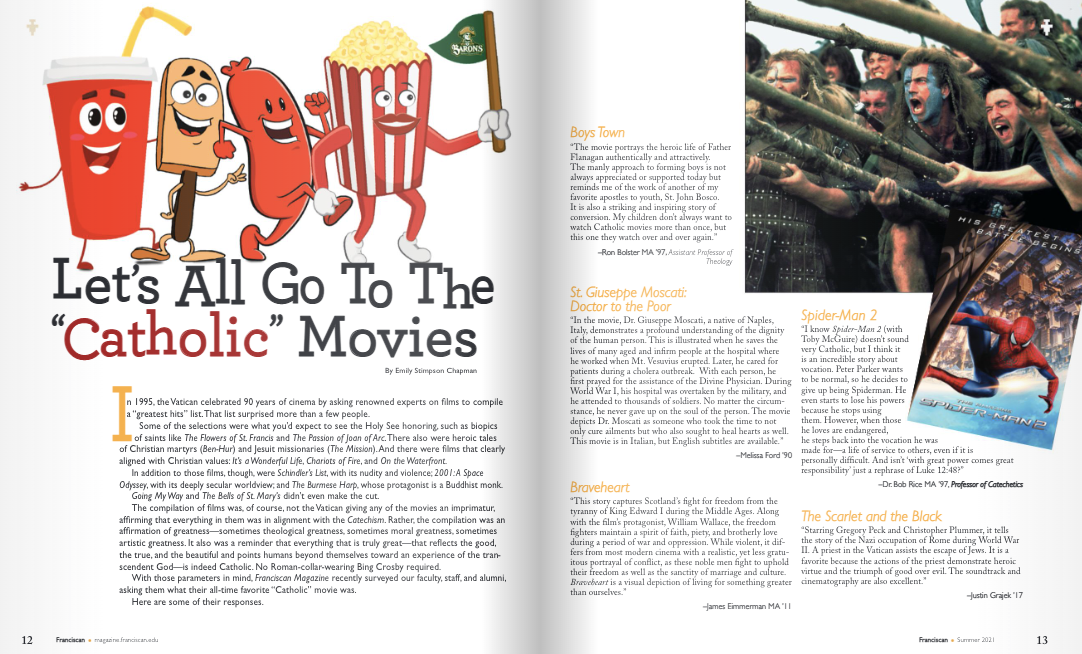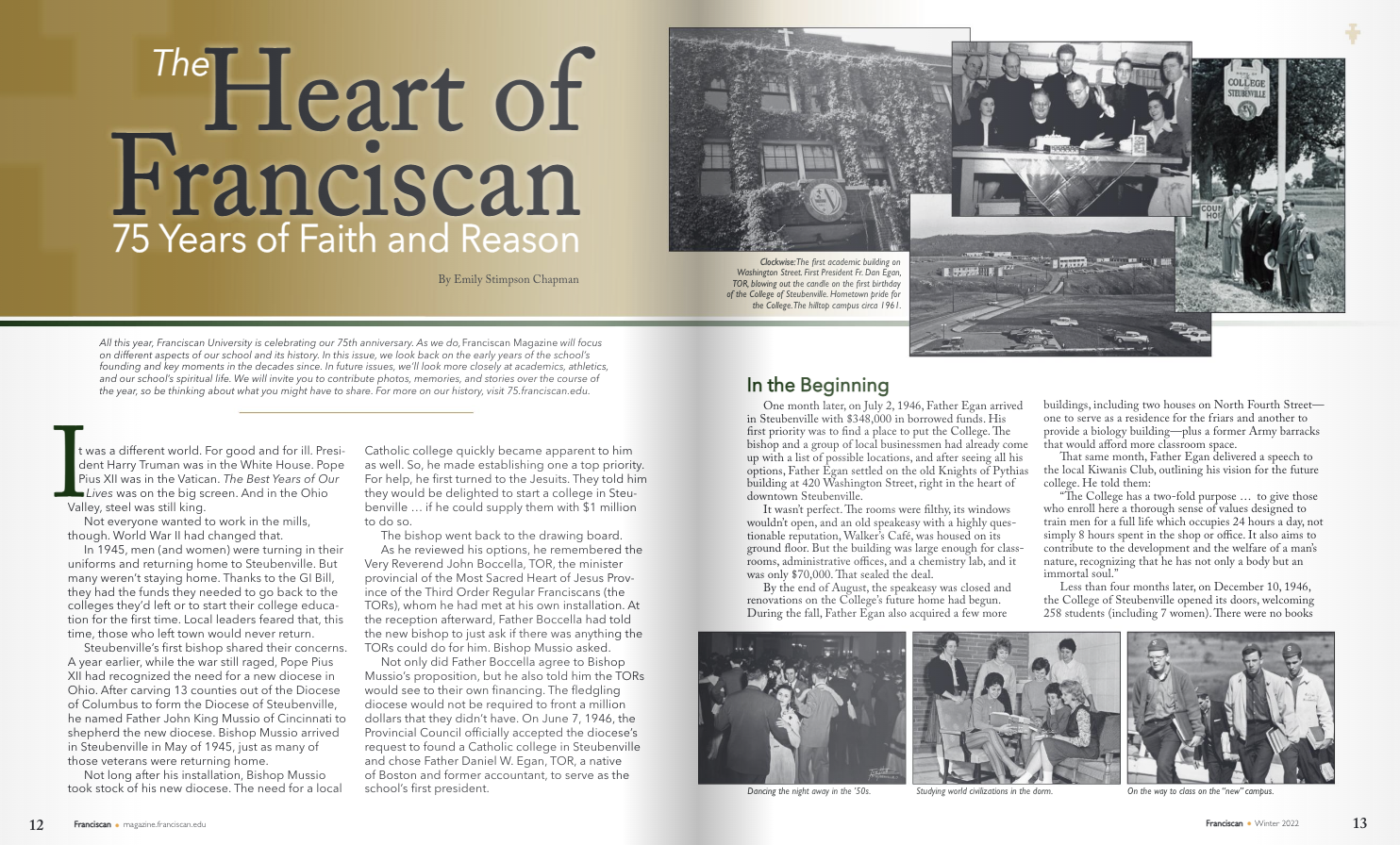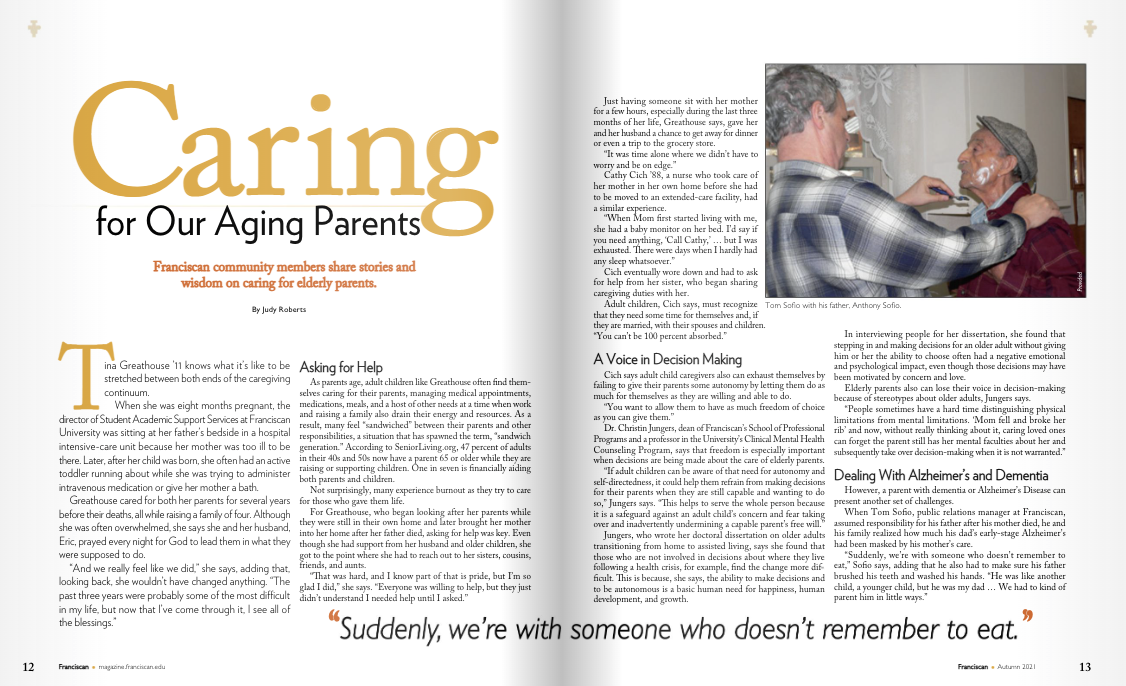The year was 2002, and David Schmiesing had a new role at Franciscan University. The Class of 1992 alumnus had worked first in the University’s Christian Outreach Office then in the Business Services Office after he’d graduated. Now, as associate dean of Student Development in the Student Life Department—a newly created position—his responsibilities included developing a first-year experience program. He didn’t know it then, but that one task would make him—and the University—a pioneer of sorts.
“There was no roadmap for what Franciscan wanted to do. We saw the need to go beyond helping freshmen successfully navigate the move from high school to college,” Schmiesing says. “We wanted to prepare our students to engage the world and culture as Catholics in every vocation and profession, even in secular fields that might be hostile to the faith.”
So, Schmiesing began exploring Church documents, gleaning insights from Apostolicam Actuositatem, Gaudium et Spes, Lumen Gentium, and especially Pope John Paul II’s Christifidelis Laici (“On the Vocation and Mission of the Lay Faithful in the Church and in the World”)—especially Christifidelis Laici’s paragraph 58, and especially this line:
“The fundamental objective of the formation of the lay faithful is an ever-clearer discovery of one’s vocation and the ever-greater willingness to live it so as to fulfill one’s mission.”
That sentence set him on a path he would follow for the next 21 years.
“I realized that if this was really true, then this was the work Franciscan needed to focus on.”
Personal vocation formation is really answering what has become a crisis in our age of people not listening for Christ’s call—or responding to it.
In 2003, he read Personal Vocation: God Calls Everyone by Name, a new book by Germain Grisez and Russell Shaw that gave a name—“personal vocation”—to the concept he’d discovered in Christifidelis Laici.
“They made the distinction between ‘state of life’ and ‘personal vocation,’ and the argument that to get state of life discerned correctly, we need to discern personal vocation correctly,” Schmiesing explains. “Generally, we are not doing that well in the Church. When the Church talks about vocation, it means priesthood, religious life, and sometimes marriage, but not the unique, unrepeatable call and mission for each person, revealed continuously throughout life, and lived out in the daily circumstances of life.”
A conversation with Father Dave Pivonka, TOR ’89, then Franciscan’s vice president for Mission and Planning, provided a distinctively Franciscan tie-in to personal vocation through three Franciscan charisms: the Incarnation, Christo-centrism, and ongoing conversion.
The Incarnation, Schmiesing says, was particularly interesting in this context: “It gave a dignity and a priority to developing secular competencies and skills. The ‘stuff of creation’ was redeemed by the Incarnation, and we are called to play a role in perfecting and redeeming that creation.”
He integrated his growing understanding of personal vocation into that early first-year experience program as well as into weekend leadership retreats, but in 2010, Franciscan University began to move toward a more intentional and long-term student leadership development program.
Schmiesing had earned his master’s in educational leadership in 2000 and had become vice president of Student Life in 2006, so he felt confident about creating the “leadership” components of the Center for Leadership. He felt less confident about the personal vocation part he knew it needed. He turned to fellow alumnus Dr. Joshua Miller MA ’04, co-founder and executive director of the Inscape Center for Personal Vocation, for whom helping people flourish in their personal vocation had been a long-time passion.
“Josh ended up playing a leading role in designing the freshman Center for Leadership curriculum we launched in 2011, integrating personal vocation formation but also building in self-reflection and self-assessment, where students reflect upon their own life and begin to see how God has acted and how God continues to call them.”
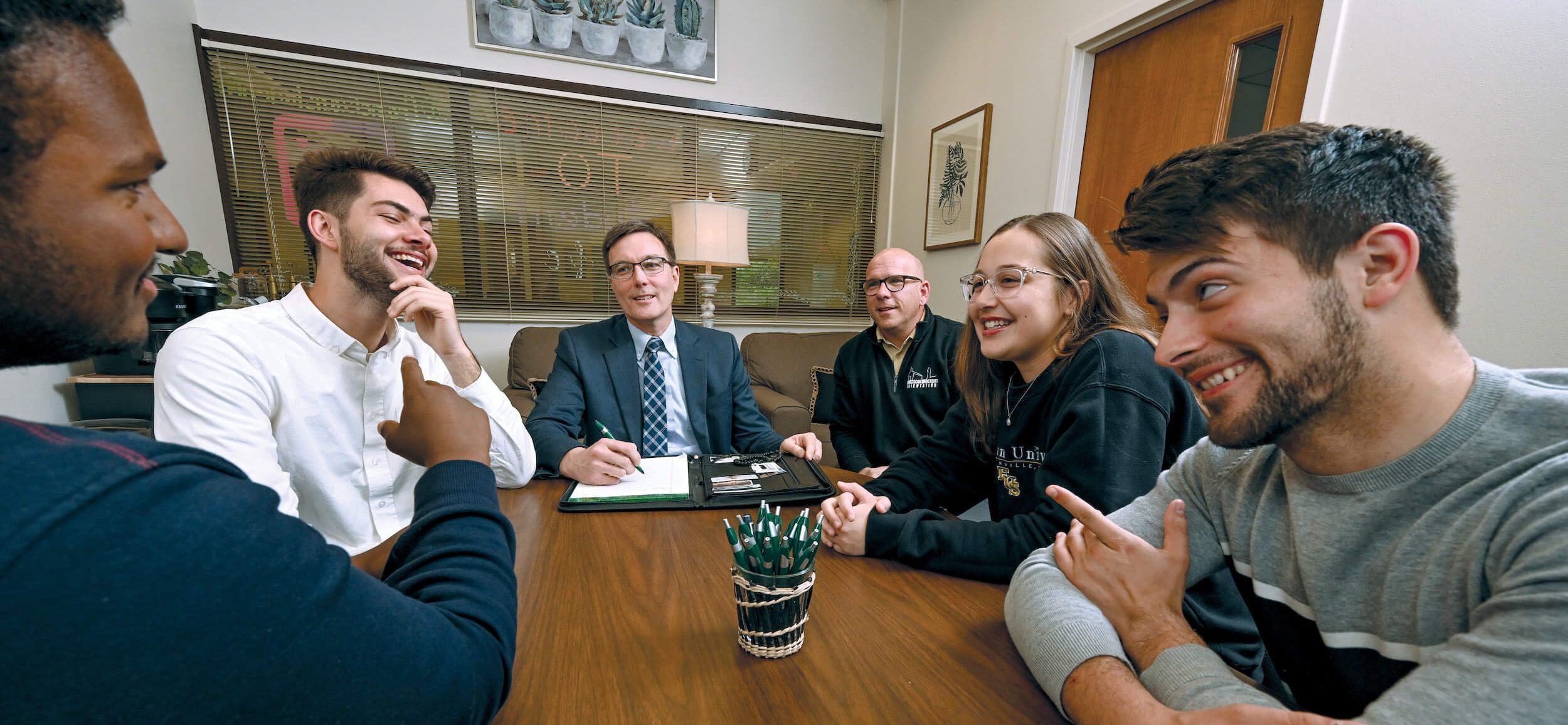
David Schmiesing ’92 MSE ’00, dean for Personal Vocation, and Dr. Dan Dentino ’97, vice president of Student Life, with outgoing and incoming student government officers Jared Johnson, Gabe Denley, Emily Rosaschi, and Caleb Rider.
Over the years, their work grew and gained increasing support from Franciscan University’s administration and faculty, until personal vocation formation became a key part of the institution-wide strategic plan in 2021. Then, when the University created the Office for Personal Vocation later that year, Schmiesing dedicated himself fully to that mission as the first dean of Personal Vocation with Miller as director of Coaching and Programming.
“I’m passionate about our students learning, growing, and responding to God’s call in their lives,” Schmiesing says. “I believe in personal vocation. The more I spend time on it, the more I’ve come to think this is what the Church needs, not just our students.”
What Personal Vocation Is—And Isn’t
What the Church needs is more people listening for Christ’s voice and answering his call to “rebuild my Church,” Miller says. Thus, Franciscan’s definition of personal vocation as “God’s unique call to each human person” encompasses a call to holiness as well as state of life and career discernment.
Miller says, “We’re trying to help young adults grow in deep self-awareness because they can’t adequately discern a career unless they’re aware of who they are and what their gifts are.”
The co-author of Unrepeatable: Cultivating the Unique Calling of Every Person (2018), Miller has noticed how lightly students will make decisions about their major without any critical self-exploration.
“We, as a culture, lack interior depth,” he says.
Miller also sees that many people don’t recognize their own dignity and the ways they can and do contribute to the good of society.
“So, if we’re building a culture of personal vocation, we’re building a culture where we know each one by name; we can help each person recognize that he or she has made contributions, can make contributions, and are called to make contributions,” he offers.
Set the World on Fire—Now
A personal vocation encompasses not only a future goal; it’s for the here and now. The concept remains dynamic and constant as God calls each person daily for a lifetime. Franciscan sees personal vocation intimately tied to the call of the laity, considering that most Franciscan students will comprise this demographic.
Even students who have a higher calling to the priesthood or religious life have a personal call within their priestly or religious vocation. Miller uses the example of Father Donald Calloway, MIC ’99. He is a priest but, through speaking engagements and writing, he’s fulfilling an important aspect of his personal vocation, which is to spread devotion to St. Joseph by encouraging people to consecrate their lives to the saint.
In line with Pope Francis’ thinking, Miller feels the Church needs to address the full meaning of vocation and not undervalue personal vocation in the present moment.
We’re trying to help young adults grow in deep self-awareness because they can’t adequately discern a career unless they’re aware of who they are and what their gifts are.
“There’s been a lot of good work around helping people discern vocation as state of life, but it’s seldom we have a culture where there’s a recognition that personal vocation is a present reality—the sacrament of the present moment.”
Dr. Robert McNamara, assistant professor of philosophy, teaches a personal vocation-focused class that looks at that bigger picture.
“Within the traditional states of life, each individual has a role to play because we’ve all been created by God for a purpose,” he says. “If we discover that purpose within the broader category of married or consecrated life, then we’ll flourish much more fully, more readily, more easily.”
He goes on: “God’s grace will become manifest in our lives, and the words of St. Catherine of Siena will come to life: ‘Be who God made you to be, and you will set the world on fire.’”
The Desire to Live Holy Lives
An essential component of personal vocation is sanctity.
Schmiesing explains, “We’re all continually called to turn away from sin, selfishness, vice, and to turn toward God, toward love, and toward excellence.”
That continual call to turn away from sin—that charism of “ongoing conversion” identified by Father Dave—is core to the spirituality of the Franciscan Friars, Third Order Regular, who founded Franciscan University. Many Franciscan University students embrace that charism and desire to live holy lives. The path of discerning their personal vocation is the way to achieve holiness.
“It’s exciting because then the student realizes, ‘everything good that I do, including my career, my hobbies, and my gifts, all of that encompasses becoming holy,’” Schmiesing says.
Life becomes less compartmentalized, and discerning God’s personalized call answers the big questions: “Who am I?” “Why am I here?” Personal vocation addresses the need, as human beings, to be seen as special without feeding into narcissism and self-centeredness.
“Ultimately, personal vocation calls us out of ourselves, responding in service to others and with others,” Schmiesing explains.
Living out a personal vocation leads to heaven and brings others with us.
“The extent to which we can help students realize that, understand it, live it out makes us better, our families’ lives better, the Church better, and the world better,” he says. “I would argue that Franciscan’s approach of encouraging, challenging, and enabling students to pursue their personal vocation is actually the answer to the shortage of priestly vocations.”
How Franciscan Does Personal Vocation
Although the idea of personal vocation didn’t originate with Franciscan, the University’s intentionality and campus-wide efforts are unique. Historically, Franciscan has helped students discern God’s will for them through academic coursework, academic advising, and relationships with faculty as well as household life, mission trips, works of mercy, and an array of spiritual growth opportunities in the chapel and with the friars and sisters on campus.
And, since 2011, Franciscan’s four-year, co-curricular Center for Leadership, now called the Leadership Institute Student Fellows, has taught select students to pursue educational goals that align with their talents and passions and to form them as leaders who positively impact familial, professional, civic, and parish life, thereby renewing culture and society.
Joe Rooney, who graduated in 2017 in philosophy and theology and added an MBA in 2019, took part in the Center for Leadership. He was also in the University’s Priestly Discernment Program for four years and spent three summers in Magadan, Russia, a former gulag, doing mission work. The alum is now married with two children, living out his personal calling in the business world. Through it all, he says he has listened for God’s call.
He shares, “Franciscan University provided an environment of building sensitivity to the inspirations of the Holy Spirit. It’s a place where you start to build an intuition about how to discern.”
Curricular and Co-curricular Integration
Franciscan University is creating a culture of personal vocation through curricular and co-curricular integration, internships, coaching/mentoring, and more. These efforts assist students as they begin answering the question: “What is God uniquely and personally calling me to do?” These efforts also help develop the knowledge, virtues, and skills to respond faithfully to God’s beckoning.
Four classes that include substantial personal vocation content have especially resonated with students: Business and Vocation; Franciscan Quest; Philosophy of the Human Person; and Living Your Personal Vocation.
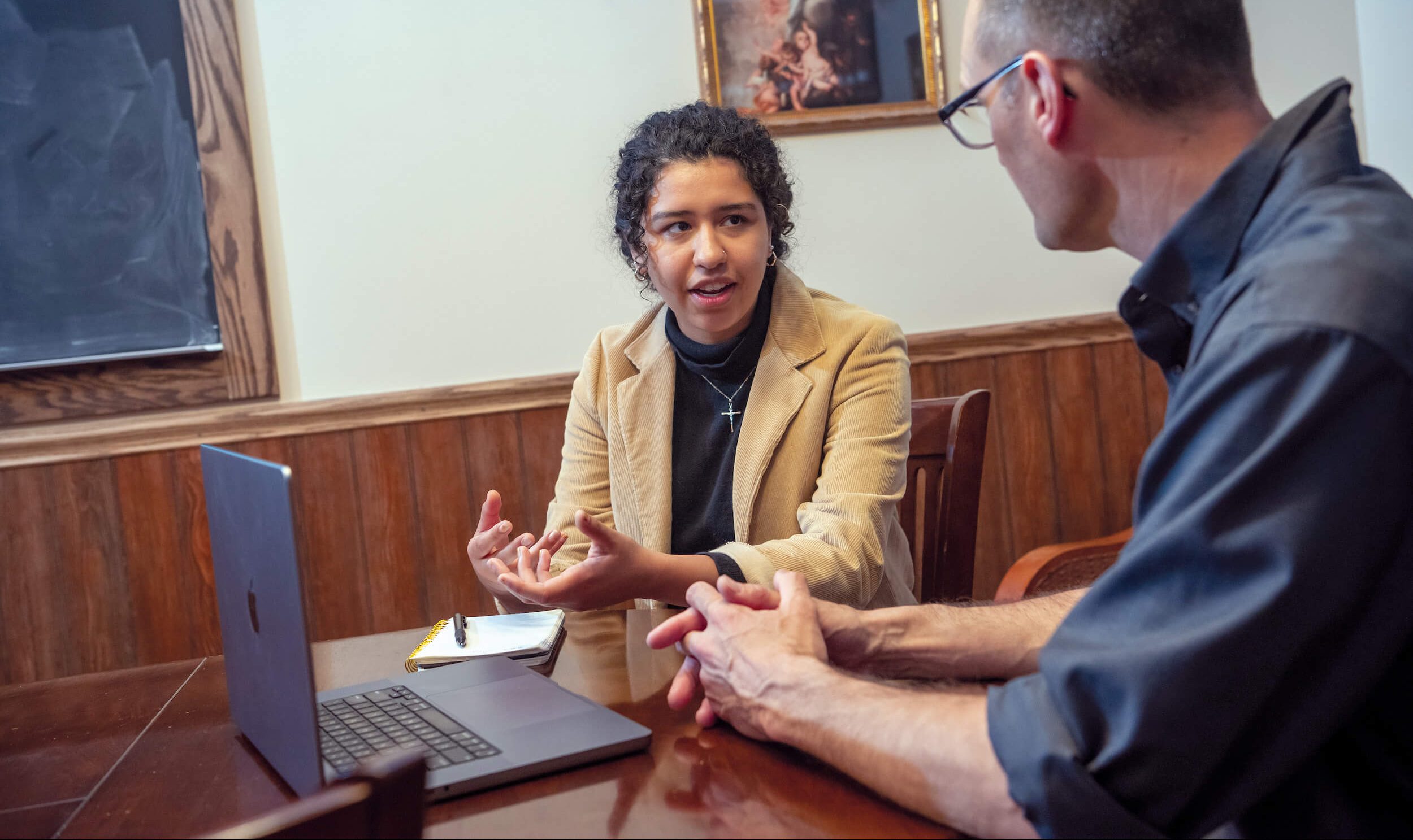
Student Coach Alina Rodriguez with Dr. Joshua Miller MA ’04
Living Your Personal Vocation
Living Your Personal Vocation is a free, non-credit, 14-week seminar, which began as an online vehicle to help a broad cross-section of students—including underclass, graduate, and older non-traditional students—to discern God’s unique calling for them. Students meet for discussion through a weekly one-hour Zoom session. Trained vocation coaches are also available to mentor students during the semester, meeting with students individually at least once every three weeks.
Lindsey Haynes, director of Franciscan Life Online and a vocation coach through Franciscan’s Leadership Institute Student Fellows, sees students’ lives change because of the seminar.
“It’s incredible how the opportunity to genuinely reflect on your personal vocation and to have the freedom to ask questions like, ‘How did God design me? What is God calling me to do? And how am I equipped to do that thing?’ catalyzes the students and sets them off on a trajectory to do things they never imagined they would do.”
Sophia Lebano ’23 from Philadelphia, Pennsylvania, is one of those students. She not only realized her true dream but also met her best friend in the class and decided to move from Franciscan’s online courses to in-person classes.
At the beginning of the seminar, Lebano planned to become a canon lawyer. However, it became clear through the class that her side business SophiaLebano.com—a custom website design and marketing company geared toward Catholics and Christians—was what gave her joy.
One way the seminar helps students uncover their personal vocation is through an exercise of looking at their fulfillment stories, which answer the question: “When in your life did you feel most fulfilled?” Students write about three occasions when they felt a sense of accomplishment or achievement— joy in completing a task well. The class and the professors discuss the stories and look for common themes.
“The fulfillment story shows a person’s strength in action,” says Haynes. “Our fulfillment stories show us when we’re fully alive and when we’re glorifying God.”
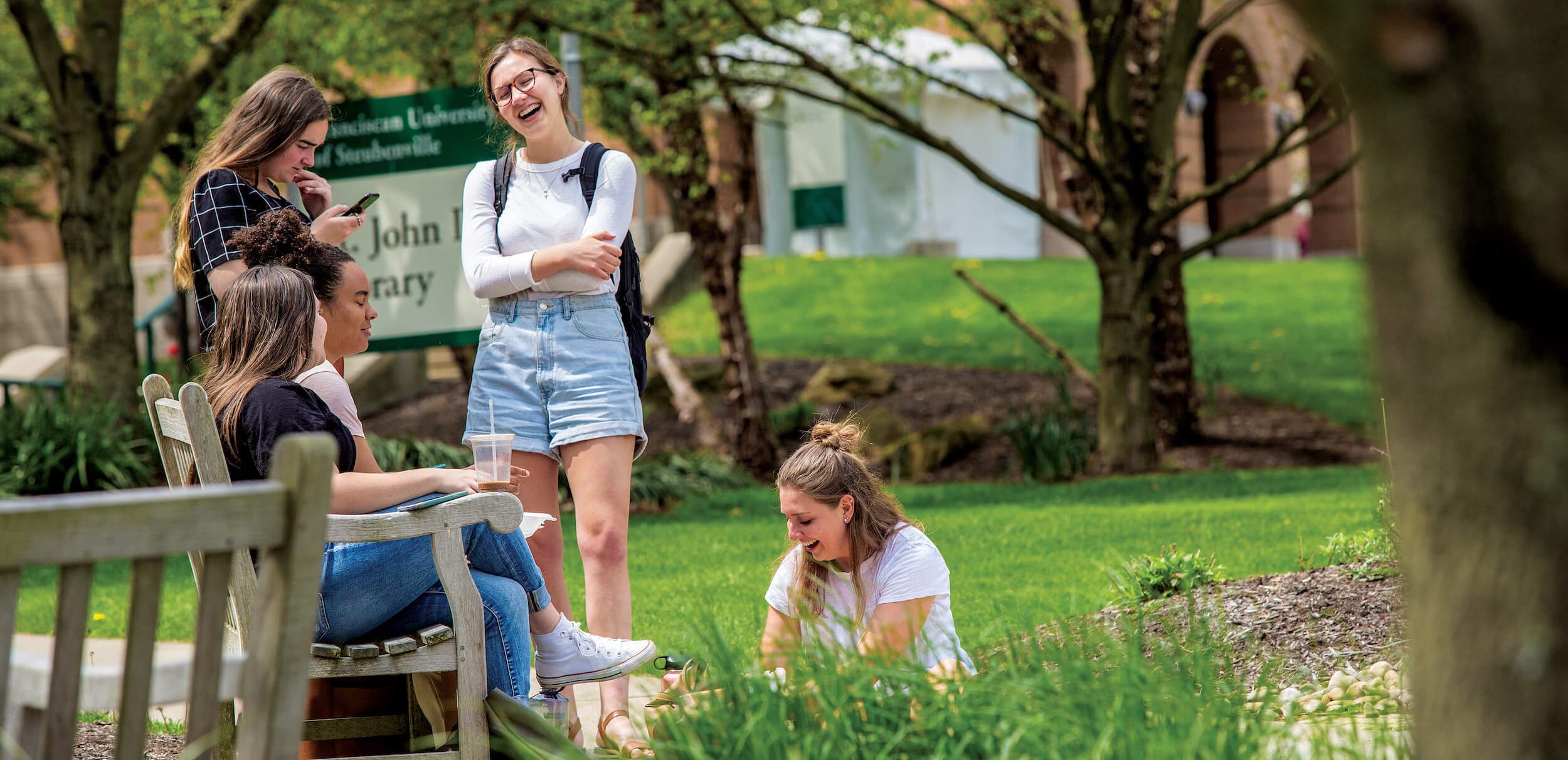
One common theme in Lebano’s fulfillment stories was the small business she had started at age 18.
“That’s when I slowly realized I might not have a passion in serving people through canon law but through my business where I was creating something for my customers to see and love,” Lebano says.
Non-traditional student Cathy Rodriguez, 52, from Frisco, Texas, took the online seminar twice. She desired to go deeper and discover God’s plans for her. The mother of two was in a new phase of life as both children went off to college.
Rodriguez says, “This class seemed like the perfect opportunity to explore what God had planned for me with some guidance.”
The reflective nature of the seminar led Rodriguez to think perhaps God wanted her to write a children’s book, though she wasn’t sure about the mechanics of getting a book published. But, one thing a guest speaker told the class kept coming back to her: “God can’t work in you if you are not willing to move.”
Rodriguez, who has a master’s in language, reading, and culture, began to recognize that God had equipped her to turn her idea into a reality, and she saw the Lord opening doors for her.
“At first, it felt daunting, but I was trying to be obedient to where he was leading,” she says.
In February 2023, Rodriguez sent Haynes an Amazon link to her newly published book, Catholic Me From A to Z: A Catholic Bilingual Alphabet.
“When it came in the mail, I fell on my knees in thanksgiving,” shares Rodriguez,
She adds, “If I had not taken the class, I don’t think I would have dug so deeply into myself to really pray and discern. The seminar prompted me to not just think about writing a book but to do it.”
Lebano and Rodriguez received some clear revelations from the Living Your Personal Vocation seminar. However, Haynes says the course doesn’t promise students will have their entire life figured out by the end of the class.
“But what we’re doing is putting tools in their toolbox so when they leave the seminar, they have tools for discernment moving forward for the rest of their lives.”
Philosophy of the Human Person
In his section of Philosophy of the Human Person, Miller also utilizes fulfillment stories to help students better understand themselves. Miller has taught the course for four semesters with approximately 40 students per semester. As in the Living Your Personal Vocation seminar, students write narratives, this time about occasions they have felt grateful.
“For the assignment, students identify the fulfillment stories and then they link those with other journal entries related to them, charting their life course in gratitude to God and gratitude to others,” Miller explains. “And I have the students think through the connections between their fulfillment stories and the top careers that the Pathway U Assessment indicates.”
Miller also has them consider the implications of virtue and vice on the trajectory of their lives. The class completes an exercise in which they think through the virtues they aspire to develop; they also address a vice they might fall prey to and what life might look like if they pursued that vice or virtue. In conjunction, Miller has students think of someone essential to their fulfillment stories—someone who helped them succeed— and write them a letter of gratitude.
“When they give gratitude to that person, it’s profoundly rich. The relationships present in that fulfillment story become solidified and deepened, and, in some cases, healing takes place.”
Miller adds, “The students see connections between their stories and what they want to do with their studies and with their career. When they realize their vocation is not just down the road, but they’ve already enacted it and they’ve already done good—made a great contribution—it’s just life-giving for them.”
Each assignment Miller gives has the goal of helping students become their best self. It’s about creating a culture oriented toward an endpoint of everybody achieving heaven.
Franciscan Quest
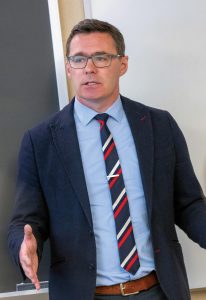
Dr. Robert McNamara
Two sections of Franciscan Quest ran as a pilot in fall 2022 to inspire first-year students to attend to their life—their life story. The course delves into what it means to be a university student at Franciscan, the significance of academic life, and how students can live out the Franciscan charism of ongoing conversion. The class also has an anthropological focus, looking at the meaning of humanness, the meaning of the soul-body composite, what sexuality and gender mean for the course of human life, and the significance of human vocation.
Dr. Robert McNamara says, “The Franciscan Quest course allowed me to draw upon teachings from metaphysics, from ethics, from Theology of the Body, and other subjects and forge them into a unity for the sake of the holistic development of the student.”
Many students felt the class helped them to better understand themselves.
“It was quite startling to me how significant it had been for several of the students and to what degree they engaged in the course,” he says. “I was pleasantly surprised it had such an impact.”
Freshman Mina Ojmaya, here from Iraq thanks, in part, to the support of the Most Reverend Bashar Warda, CSsR, Chaldean archbishop of Erbil, took Franciscan Quest and Miller’s Philosophy of the Human Person. She says the classes—plus participating in the Center for Leadership— helped her discover more about herself and confirmed she was on the right path academically. Before that, she sometimes worried whether clinical psychology was the correct major for her.
Another important lesson, Ojmaya says she and other students learned: “Our joy doesn’t come from just big things. And I don’t have to do something great to help society; even small steps make a big difference.”
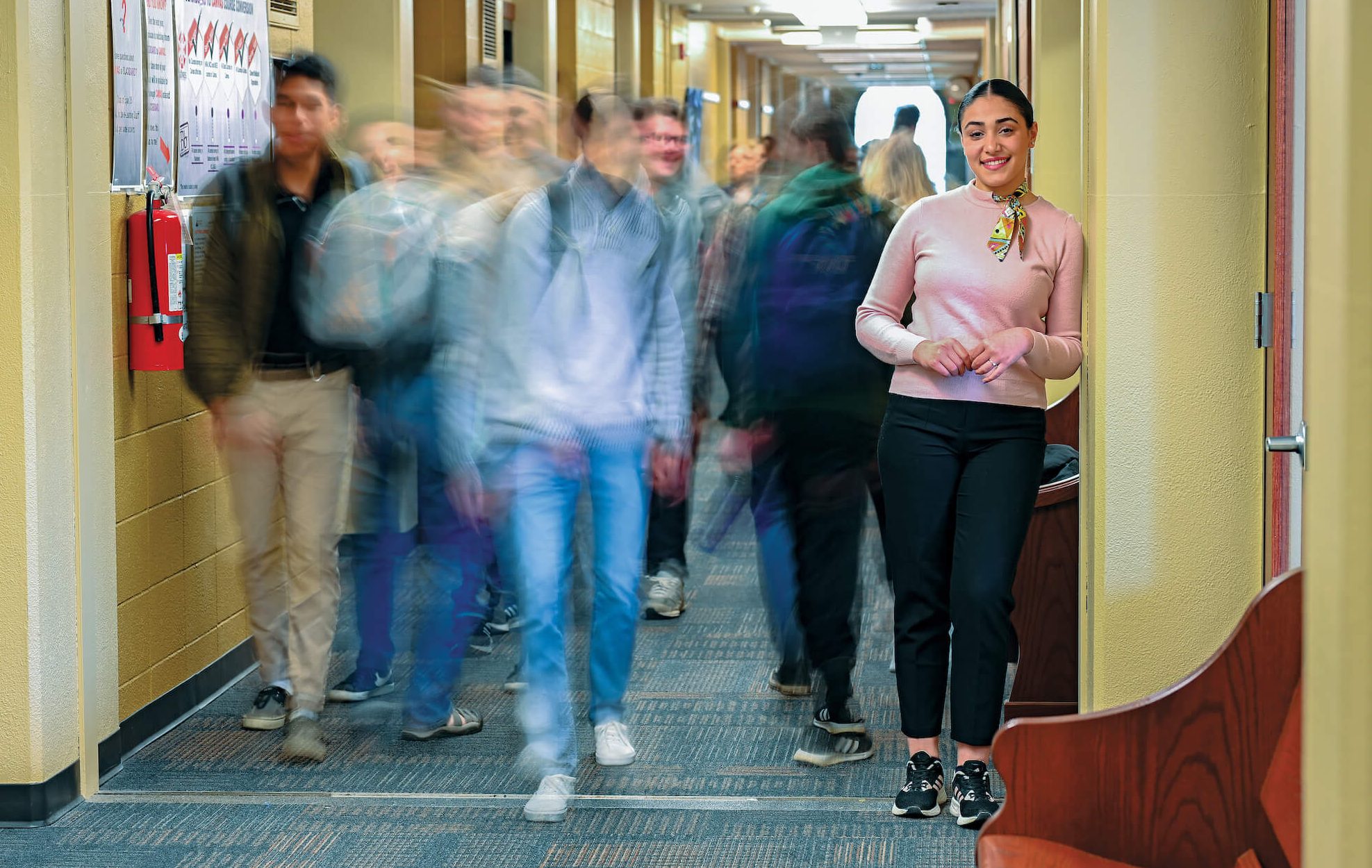
Freshman Mina Ojmaya from Iraq says the Center for Leadership and personal vocation classes have confirmed she’s on the right path academically.
Vocation and Business
Dr. Deborah Savage, professor of theology, brings fascinating insights into how working in the business sector doesn’t negate holiness. She teaches a brand-new course at Franciscan called The Catholic Faith and the Vocation of the Business Leader, offering her 25-plus years of business experience and her research studying the theological meaning of human work as a path to personal conversion and sanctification. Savage led quality management for businesses such as Honeywell and Advanced Micro Devices before earning her doctorate in religious studies.
“Business is a calling because it serves the common good. It’s not just something you do for pay, and it’s not necessarily populated with all sorts of greedy people who don’t care about anything but money. The source of the business proposition really is human creativity,” she says.
“The vocation of the business leader is to realize the authentic good business does and to guide the organization toward an authentic good.”
Every pope since Leo XIII has written something about the social question: “How do we live at peace secured by justice and prosperity?” Her classes particularly look at Pope John Paul II’s writings in his encyclical on human work, Laborem Exercens.
The vocation of the business leader is to realize the authentic good business does and to guide the organization toward an authentic good.
In 1981, he wrote, “Work is a good thing for man—a good thing for his humanity— because through work man not only transforms nature, adapting it to his own needs, but he also achieves fulfillment as a human being and indeed, in a sense, becomes ‘more a human being.’
Business serves humanity in important ways when profit is not its only objective. The aim of business is to help people by creating goods and services people need to allow them and their families to flourish, says Savage.
“Once you lose sight of that, and the only thing you’re obsessed with is the bottom line or short-term profits, then you’re betraying what is really a vocation to serve other people,” she says.
The secret is to integrate virtue into all aspects of one’s life.
“The virtues can be practiced and must be practiced no matter where I am, whether I’m at home or in the workplace,” she says. “The mission of the laity is to transform the temporal order. It is through our work, no matter where it takes place, that we return all things to Christ.”
Practical Experiences
Franciscan is also becoming more intentional about approaching experiential learning from a Catholic worldview.
Dr. Christin Jungers, dean of the School of Professional Programs, says, “We’re making more explicit the Christian framework for that experience.”
While Franciscan has always had internship opportunities for students, the school is now thinking about them both from a professional point of view and for how the internship relates to the student’s personal vocation.
She says the questions for the student are: “Where do you see yourself being invited by God and how are you co-creating this experience of your life with God in the internship?” She adds, “Internships are one way to begin to better understand one’s vocation.”
Junior business major Joseph Hillaert from Front Royal, Virginia, has made it his goal to get as much experience as possible so he knows which aspect of accounting he will pursue. When he returns to school this fall, he will have completed internships at the St. Paul Center, Joyce CPAs, a data managing company called Reltio, St. Joseph Financial Services, and PricewaterhouseCoopers.
Hillaert has grasped what the University wants students to understand even as they prepare for their careers: Education isn’t only about launching them into a profession.
He says, “God has given me a set of talents, skills, and strengths that he’s entrusted me with—much like the Parable of the Talents [Matt. 25:14–30]. So, to steward that well, I am looking at where he’s calling me to bring those gifts to fruition.”
As Miller puts it, “Career is important, having a good job is important, but we also want to help students navigate post-graduation in a way that’s healthy and effective.”
Schmiesing adds, “The goal is to help students answer the question: ‘What’s God calling me to do?’ And then to help them take the practical steps to answer that call.”
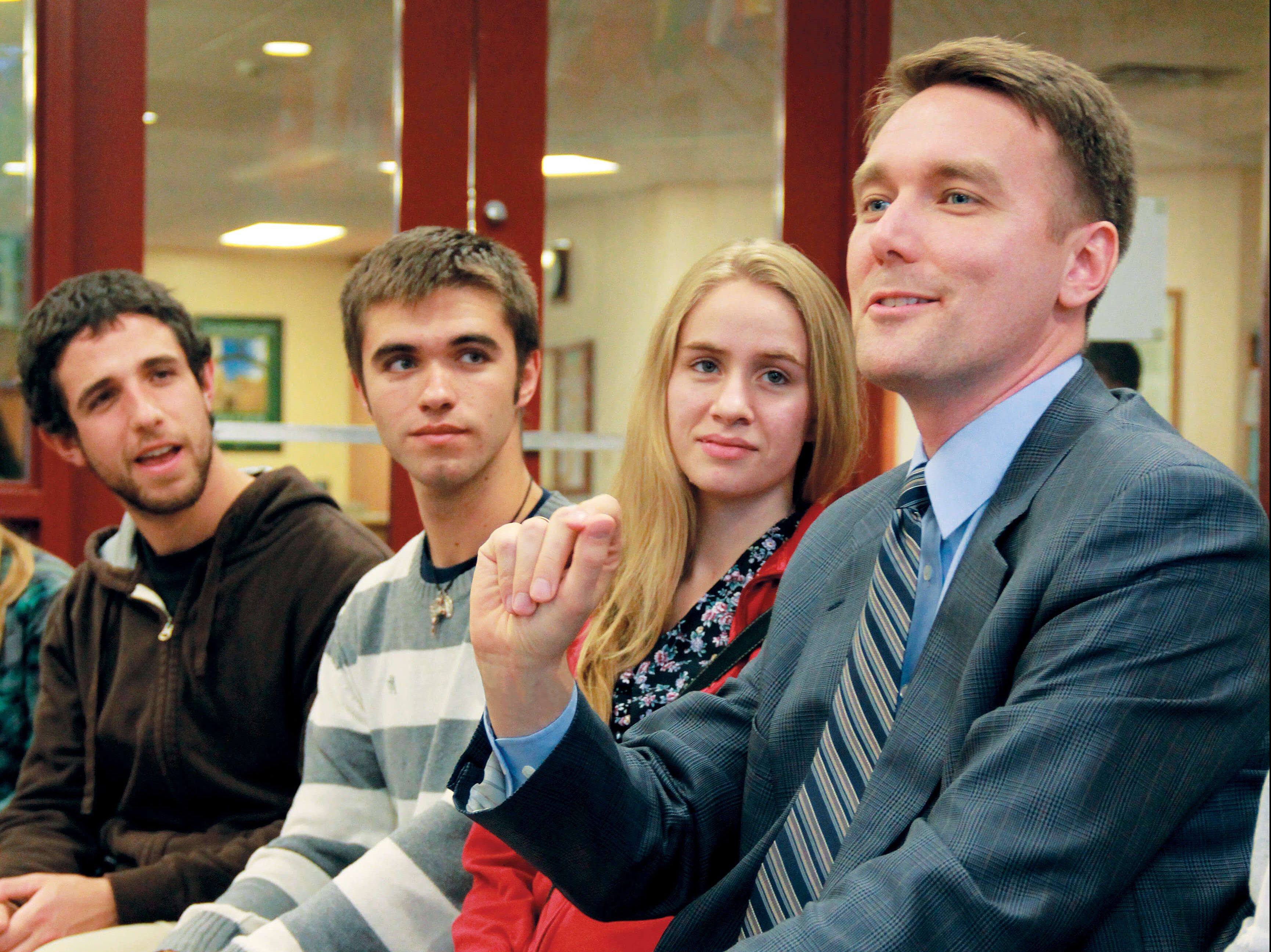
David Schmiesing pioneered and still leads personal vocation formation at Franciscan.
Campuswide Effort
Miller and Schmiesing say more professors in every discipline are integrating personal vocation into their lessons and internships.
“Our faculty are seeing themselves as part of this work to help our students to hear God’s call, to discern it, and then respond to it practically,” says Schmiesing, noting faculty play an essential role in showing students why God’s calling can be to any field, not only to mission or ministry.
“I think our institutional commitment and efforts are unique. Other schools may focus on a student’s purpose or on beefing up career services, but we’re not aware of any other Catholic university seeking to integrate personal vocation formation across campus,” he adds.
With the full backing of Father Dave and the Board of Trustees for the past two years and the ability to work on personal vocation full time, Schmiesing and Miller love to see more students engaging the vital questions of what God has created them—and only them—to do in this world.
“Personal vocation formation is really answering what has become a crisis in our age of people not listening for Christ’s call—or responding to it,” Schmiesing says. “Now, instead of helping a couple of hundred students through limited programs, Franciscan can help a few thousand every year.”
Despite the wonderful progress so far, Schmiesing says they have much more territory to cover.
“Christifidelis Laici, the key and centerpiece of all we’re doing, hasn’t been fully mined even though it was written 35 years ago,” he says. “There’s so much more to learn and discover and share. I’m excited to see where God leads us next.”
For more information about Franciscan University’s personal vocation formation, visit here.
Personal Vocation + Career Planning = Success
By Lisa Ferguson
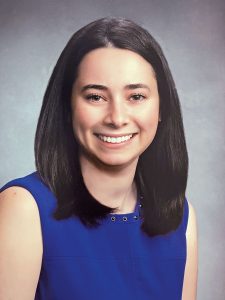
Maria Lencki ’20, Fox News, NY
Personal vocation and career planning go hand in hand, according to Mark McGuire ’79, director of Career Services.
“If students are seeking to discern and respond to God’s will for their lives, that priority guides them through the usual Career Services tasks,” he says. “Whether they are doing Pathway U assessments to gain self-understanding, writing a résumé, searching for internships and jobs, or preparing for an interview, they’re doing it with the goal of becoming a saint while pursuing excellence in their professions.”
Maria Lencki ’20, a political science and communication arts double major and Center for Leadership member, says, “Walking into Career Services was a life-changing moment for me.”
She found McGuire and the Career Services team especially helpful in pursuing undergrad internships at the White House and a student fellowship at The Heritage Foundation. Their advice also helped Maria attain her current position, digital production assistant at Fox News in New York, where she writes articles, interviews sources, and assists with web video coverage of shows.
Here, Maria answers questions about her journey.
1. What is God’s call for your life?
It’s to use my talents to serve him and make the world a better place. I am a journalist, and I desire to bring God’s truth into the world through my fair reporting. My faith is very ingrained in my career because God calls us to always seek what is true, good, and beautiful. I begin my days with prayer and ask God to lead me as I share the news with others.
2. How did this understanding fit with your career planning?
I was drawn to journalism from a young age. At 6 years old, I was allowed to stay up late, eat pop-corn, and watch the news. As I was thinking about my personal vocation, I knew I was passionate about politics, and I love to write. My political science and journalism courses at Franciscan showed me how I could serve God in my career, and I knew this was the path for me.
3. How’s it going so far?
I feel a lot of peace in my work, and I know from experience the saying, “If you love what you do, you never work a day in your life,” is 100 percent true!
4. How did the Career Services Office assist you?
They encouraged me to put my career planning at the forefront and apply to intern at the White House. They guided me throughout the entire interview process and helped me with mock interviews, updating my résumé, setting up a LinkedIn account, and so much more. Career Services gave me the confidence to pursue my dreams, and I would not be where I am today without their advice and guidance.



